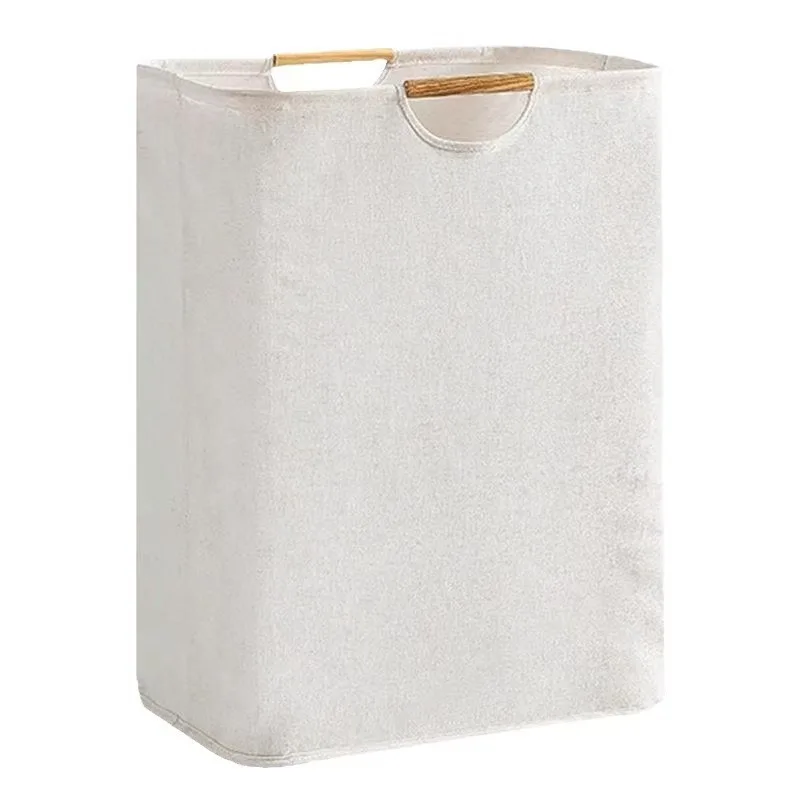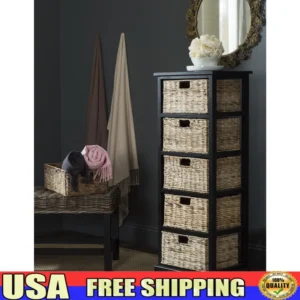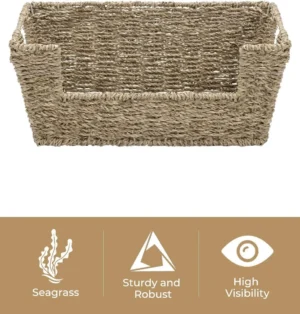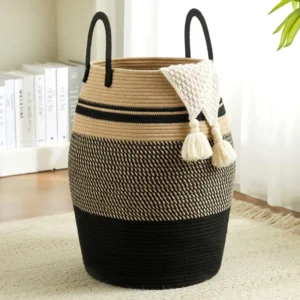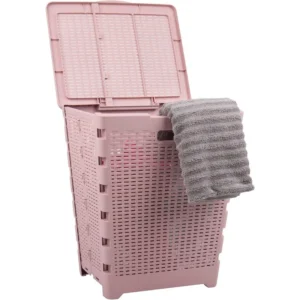Why Smart Laundry Storage Matters in Compact Living
Living in a small space doesn’t mean you have to compromise on organization or style. In fact, thoughtful laundry storage becomes even more critical when square footage is limited. With urban apartment sizes shrinking by nearly 10% in major cities over the past decade and nearly 40% of city dwellers living in spaces under 800 square feet, finding clever laundry solutions is no longer just nice—it’s necessary.
Smart laundry storage impacts both the functionality and visual appeal of compact homes in several important ways:
- Reduces visual clutter that can make small spaces feel even smaller
- Creates smoother daily routines when items have dedicated places
- Maximizes precious floor space for living rather than storing
- Transforms a utilitarian necessity into an aesthetic asset
When laundry management is optimized, you’ll notice improvements in both your home’s appearance and your daily living experience. The right laundry basket solution works with your space constraints rather than against them, complementing your decor while solving practical challenges. Understanding the fundamentals of space-saving laundry strategies can transform how you think about this everyday necessity.
Before rushing to purchase any solution, taking time to assess your specific needs will ensure you select options that truly work for your unique living situation and compact laundry storage requirements.
How to Assess Your Small Space Laundry Needs
Finding the perfect laundry solution starts with a thorough assessment of your space, habits, and specific needs. Taking inventory before shopping prevents purchasing items that won’t actually fit or function properly in your home.
Space Inventory
Begin by identifying potential locations where a laundry basket might fit:
* Measure narrow gaps between furniture or appliances
* Look for unused corner spaces
* Check clearance under beds or tables
* Assess available wall space
* Identify door spaces that could accommodate hanging options
Be precise with measurements—write down width, depth, height, and any clearance issues for each potential location. Remember to account for ventilation needs and accessibility when identifying spaces.
Usage Patterns
Consider your household’s laundry habits:
* How many people generate laundry in your home?
* How frequently do you do laundry (daily, weekly)?
* Do you prefer to sort by color, fabric type, or care instructions?
* How much volume does your typical laundry load represent?
A single person doing weekly laundry needs far less capacity than a family of four with daily washing requirements. Understanding your volume needs prevents choosing options that are either too small (causing overflow) or unnecessarily large (wasting precious space).
Lifestyle Factors
Your specific living situation creates unique considerations:
* Do you use community laundry facilities requiring transport?
* Is your laundry area also part of another living space?
* Do humidity issues require specific material considerations?
* How important is aesthetics versus pure functionality?
These factors help determine whether you need portable options, moisture-resistant materials, or designs that blend with your decor. The best save space laundry baskets are those aligned with how you actually live, not just those that fit physically.
Vertical Storage Solutions: Making Use of Height
When floor space is limited, looking upward often provides the solution. Vertical storage takes advantage of an often underutilized dimension in small spaces: height.
Tall, Slim Designs
Narrow hampers with minimal footprints maximize capacity while using minimal floor area. Look for units measuring approximately 12-14 inches in width while standing 24-30 inches tall. These slim profiles can slide between a washer and dryer or fit in narrow bathroom corners without impeding traffic flow. Many feature removable liners that make transferring clothes to the washing machine simpler.
Stacking Systems
Modular stacking units provide customizable solutions that grow upward rather than outward:
* Individual sorting baskets that stack securely
* Tiered systems with pull-out drawers or compartments
* Graduated sizes that nest when not in use
These systems work particularly well in closets or utility spaces where vertical clearance exists. Our tall wicker baskets collection offers elegant options that combine height utilization with natural materials that allow clothing to breathe.
Wall-Mounted Options
For truly minimal floor footprint, wall-mounted solutions offer complete floor clearance:
* Hanging canvas bags with sturdy mounting hardware
* Wall-attached hampers that fold flat when not in use
* Shelving systems with integrated laundry storage
Most wall-mounted options can support 15-25 pounds of clothing, making them suitable for individuals or couples. Installation typically requires basic tools and wall anchors appropriate for your specific wall type.
Door-Hanging Solutions
Utilizing the back of doors reclaims otherwise wasted space:
* Over-the-door hanging hampers with adjustable straps
* Door-mounted frames with removable bags
* Slim profile designs that allow doors to close properly
For rental properties or spaces where drilling isn’t possible, these non-permanent solutions provide excellent functionality. When considering door-hanging options, measure door clearance carefully to ensure the unit won’t prevent proper door closure.
Finding creative ways to utilize corners and awkward spaces further expands your options, as demonstrated in our guide to maximizing corner laundry basket solutions.
Hidden and Multipurpose Laundry Baskets
The ultimate small-space strategy often involves making single items serve multiple functions or finding ways to hide necessary utilities when not in use.
Under-Bed Storage Containers
Low-profile containers designed to slide beneath beds provide substantial capacity without consuming visible space:
* Wheeled designs for easy access and removal
* Divided compartments for pre-sorting
* Canvas options with reinforced handles for pulling
* Hard-sided containers for protection against dust
Most under-bed options require 6-8 inches of clearance beneath your bed frame. Before purchasing, measure both the height clearance and the depth to which you can reach comfortably. Some designs feature pull straps or handles specifically to improve accessibility.
Furniture with Integrated Hampers
Dual-purpose furniture pieces serve as both practical storage and functional items:
* Benches with hinged tops concealing laundry storage
* Ottomans with removable laundry inserts
* End tables or nightstands with slide-out hamper compartments
* Storage cabinets with ventilated laundry sections
These clever designs can hold anywhere from 1-2 loads of laundry while completely hiding it from view. Most support standard weight loads for their furniture type while also functioning as laundry storage.
Decorative Baskets
Sometimes the best solution is hiding in plain sight with attractive baskets that complement your decor while secretly serving as laundry storage:
* Large woven hampers that double as decorative elements
* Patterned fabric bins that coordinate with room color schemes
* Natural material baskets that add texture and warmth
Our selection of wicker baskets with lids exemplifies this approach, offering beautiful containers that neatly conceal contents while enhancing your space aesthetically. The natural materials also provide ventilation for damp items.
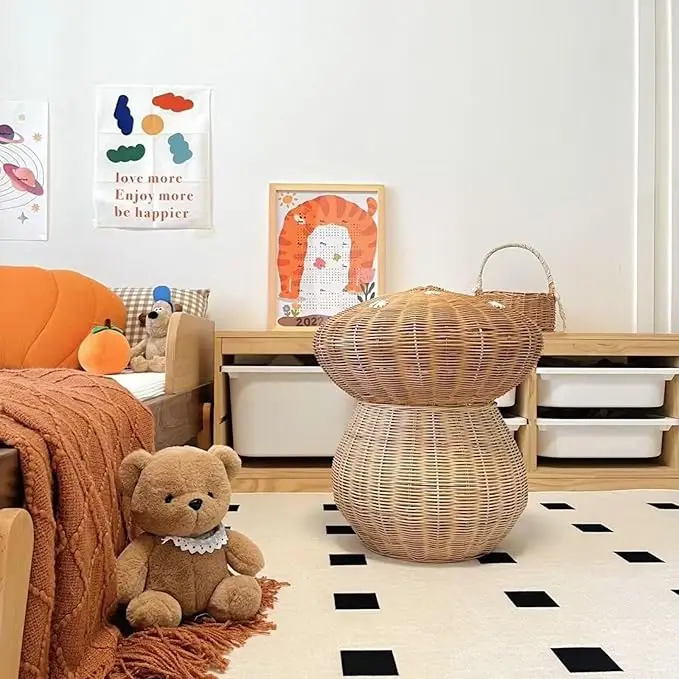
Finding ways to make your laundry storage work harder through multi-purpose baskets not only saves space but adds functionality to your living environment.
Collapsible and Foldable Options for Ultimate Flexibility
For spaces with fluctuating needs or extremely limited storage, collapsible solutions provide capacity when needed and disappear when not in use.
Pop-Up Fabric Hampers
Lightweight fabric hampers with spring-loaded frames offer remarkable space savings:
* Collapse to approximately 2 inches thick when not in use
* Spring open to full capacity in seconds
* Usually hold a full load of laundry despite compact storage dimensions
* Often include carrying handles for transport
These versatile options reduce in size by 80-90% when collapsed, making them perfect for apartments with shared laundry facilities or homes where the laundry basket needs to be stored in a cabinet between uses.
Folding Frames with Removable Bags
More structured than pop-ups but still collapsible:
* Metal or plastic frames that fold flat
* Detachable bags that can be washed separately
* Multiple configuration options depending on space
* Often include sorting features with color-coded bags
These hybrid designs provide more stability than simple pop-ups while maintaining excellent storage efficiency. Most fold to about 3-4 inches thick while supporting substantial loads when expanded.
Silicone and Plastic Collapsible Designs
For moisture resistance combined with space efficiency:
* Accordion-style designs that compress when not filled
* Heat-resistant options safe for hot laundry items
* Waterproof materials that prevent moisture transfer
* Rigid handles that remain usable even when collapsed
These options are particularly well-suited for bathrooms or other potentially humid environments where fabric might be problematic. Many reduce to 20-25% of their expanded size when collapsed.
The versatility of these options makes them particularly valuable in homes where space needs change frequently or where storage must be extremely efficient, as detailed in our guide to best collapsible laundry baskets.
Corner and Awkward Space Maximizers
Small homes often contain unusual spaces that standard rectangular hampers can’t effectively utilize. Specialized designs transform these awkward areas into functional storage opportunities.
Triangle-Shaped Corner Hampers
Geometrically designed to maximize corner space:
* 90-degree angles that fit snugly into room corners
* Curved fronts that facilitate access while minimizing footprint
* Stackable options that utilize vertical corner space
* Various depths depending on available corner clearance
These clever designs transform often wasted corner areas into functional storage, typically providing capacity for a half to full load of laundry depending on size.
Curved Designs for Unusual Spaces
Contoured shapes accommodate architectural features or furniture arrangements:
* Curved backs that follow wall contours
* Rounded fronts that reduce visual bulk in tight spaces
* Flexible materials that slightly conform to available space
* Organic shapes that complement modern interiors
These specialized designs work well in renovated spaces with unusual angles or historic homes with non-standard room configurations.
Ultra-Slim Profile Options
Extraordinarily narrow designs fit where standard baskets cannot:
* Units as narrow as 4-6 inches for extreme space limitations
* Taller heights to compensate for narrow widths
* Pull-out designs that expand when accessed
* Vertical dividers to keep items organized despite narrow profile
These specialized solutions are perfect for the tight space between a washer and wall or similar narrow gaps throughout the home.
Behind-Door Solutions
Utilizing the forgotten space behind doors:
* Hanging units that require minimal depth clearance
* Door-mounted frames with removable bags
* Low-profile designs that allow doors to function normally
* Adjustable heights to accommodate different door styles
Door space utilization requires careful measurement of clearance and swing radius, but can effectively create storage in otherwise unusable areas.
For homes with unusual layouts or architectural challenges, our versatile wicker storage baskets collection offers options that can be adapted to various space configurations.
Portable and Wheeled Laundry Solutions
For apartment dwellers, dorm residents, or anyone using shared laundry facilities, mobility becomes a key feature in laundry basket selection.
Lightweight Designs with Sturdy Handles
Engineered for comfortable carrying:
* Ergonomic grip handles positioned for balanced weight distribution
* Reinforced construction at stress points
* Lightweight materials that don’t add unnecessary weight
* Smooth edges that won’t snag clothing during transport
The best portable designs weigh less than 2 pounds empty while supporting 15-20 pounds of laundry without straining or breaking.
Rolling Carts with Sorting Compartments
Adding wheels transforms laundry transport:
* Sturdy casters that roll smoothly over various flooring
* Locking mechanisms to prevent unwanted movement
* Multiple compartments for pre-sorting
* Handles positioned at comfortable pushing/pulling heights
These mobile solutions eliminate lifting entirely, making them ideal for those with mobility concerns or navigating long hallways to laundry facilities.
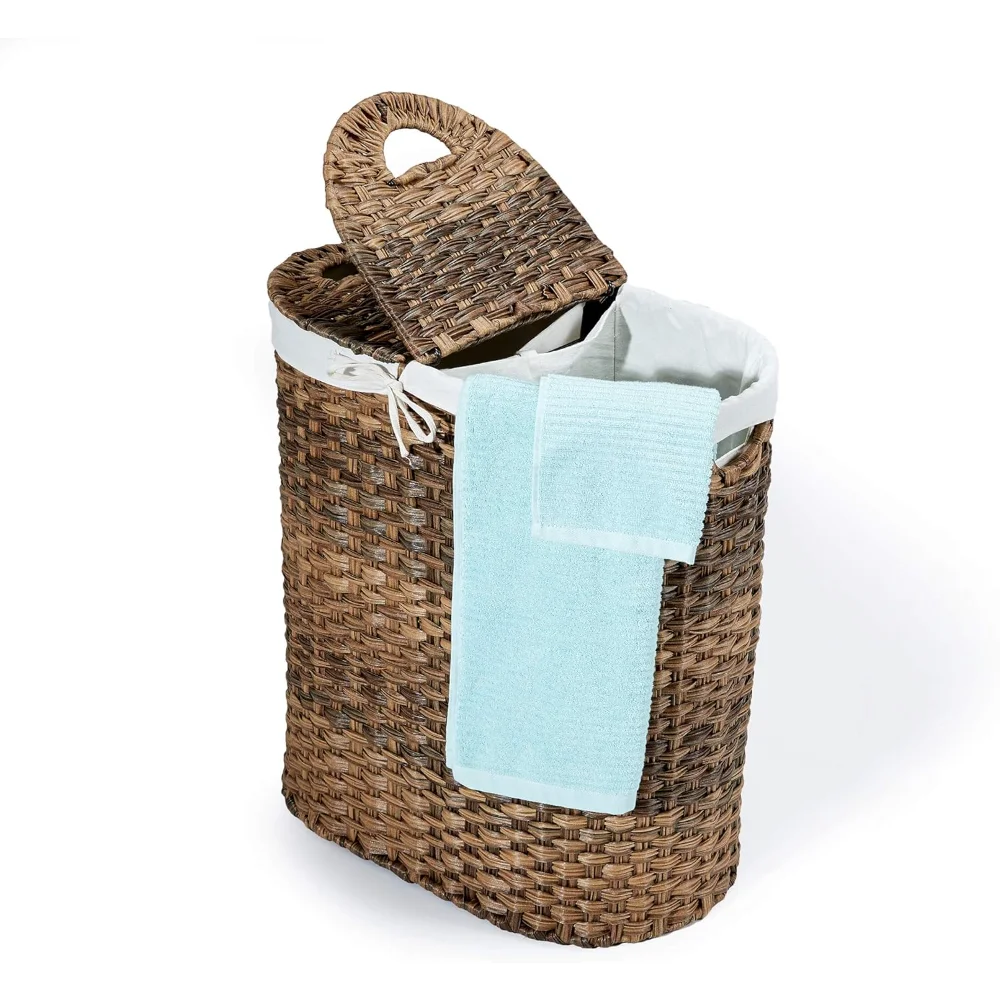
Collapsible Carts for Laundromat Trips
Specifically designed for off-site laundry needs:
* Folding frames that fit in car trunks or closets
* Heavy-duty capacity for multiple loads
* Weatherproof materials for outdoor transport
* Quick setup and breakdown mechanisms
These specialized transport solutions collapse to approximately 3-4 inches thick when not in use while expanding to hold 2-3 loads of laundry when needed.
Backpack-Style Laundry Bags
Hands-free transport for stair navigation:
* Padded shoulder straps for comfortable carrying
* Reinforced bottoms to prevent stretching
* Water-resistant materials to contain dampness
* Drawstring or zippered closures for security
These innovative designs distribute weight more evenly than traditional laundry bags, making them particularly valuable in walk-up apartments or buildings with limited elevator access.
For those requiring portable solutions, our wicker baskets with handles provide both practicality and style during transport.
Material Considerations for Small Space Durability
In small spaces, material selection impacts not just aesthetics but functionality, durability, and moisture management—all critical factors in confined environments.
| Material | Benefits | Considerations | Cleaning Recommendation | Lifespan |
|---|---|---|---|---|
| Natural Wicker/Rattan | Breathable, prevents odors, visually appealing | May be prone to mildew in high humidity | Dust regularly, occasional wipe with damp cloth | 5-10 years with proper care |
| Synthetic Fabrics | Lightweight, often foldable, wide color options | May retain odors if not breathable | Machine washable, frequent cleaning recommended | 2-5 years depending on quality |
| Plastic/Polymer | Easy to clean, moisture resistant, durable | Can crack over time, less aesthetic appeal | Regular wipe-down with disinfectant | 3-8 years depending on quality |
| Metal Frames | Stable for stacking, durable, sleek appearance | May rust in humid environments | Dusting and occasional wipe-down | 7-15+ years with proper care |
Natural Materials
Wicker, rattan, and bamboo offer excellent breathability, reducing the risk of mildew and odors—a significant advantage in small spaces where air circulation may be limited. These materials also add warmth and texture to utilitarian spaces, helping laundry storage blend with overall decor rather than standing out as purely functional.
Synthetic Fabrics
Polyester, nylon, and canvas options provide lightweight strength ideal for collapsible or portable solutions. Look for options with reinforced stitching at stress points and moisture-resistant treatments for longevity. Many fabric options now include antimicrobial treatments particularly valuable in bathroom settings.
Plastic and Polymer Options
While less aesthetically pleasing than natural materials, plastics offer exceptional moisture resistance and easy cleaning. In very humid environments or for households with children, the ability to thoroughly sanitize laundry containers may outweigh style considerations.
Metal Frames
Often combined with fabric bags or wicker elements, metal frames provide structural integrity for stacking or vertical storage. Powder-coated finishes resist humidity better than untreated metal and coordinate with bathroom fixtures or appliances.
For more detailed comparisons of material options, explore our guide to wicker vs. woven laundry baskets which examines performance in various home environments.
Sorting Systems for Limited Quarters
Contrary to popular belief, effective laundry sorting doesn’t require extensive space—just thoughtful design and organization.
Compact Multi-Compartment Designs
Space-efficient sorting in single units:
* Divided interiors with removable partitions
* Color-coded sections within minimal footprint
* Stackable sorting bins with individual access
* Narrow units with multiple vertical compartments
These all-in-one solutions typically measure 24-30 inches in width while providing 2-3 sorting compartments, effectively replacing multiple separate hampers with one space-efficient unit.
Stacking Sorters with Individual Removal
Modular approaches to sorting:
* Individual bags that lift out for transport
* Labeled compartments for clear organization
* Frames that support multiple smaller bags
* Customizable configurations based on needs
These systems allow for complete customization of sorting categories while maintaining a compact footprint, typically 18-24 inches square with vertical expansion.
Color-Coded Small Hampers
When space allows for multiple small units:
* Compact, identical hampers in different colors
* Nesting designs that stack when not full
* Coordinated sets with consistent dimensions
* Small footprints (12-15 inches) per unit
This approach works well when hampers can be distributed throughout the home—perhaps placing whites collection in the bathroom and colors in the bedroom to divide the footprint across multiple spaces.
Vertical Sorting Solutions
Utilizing height rather than width for sorting:
* Tall units with multiple drawers or compartments
* Over-door systems with separate bags
* Wall-mounted units with divided sections
* Behind-door sorting systems with minimal depth
These specialized designs typically require only 12-18 inches of floor or wall space while providing full sorting functionality through clever vertical arrangement.
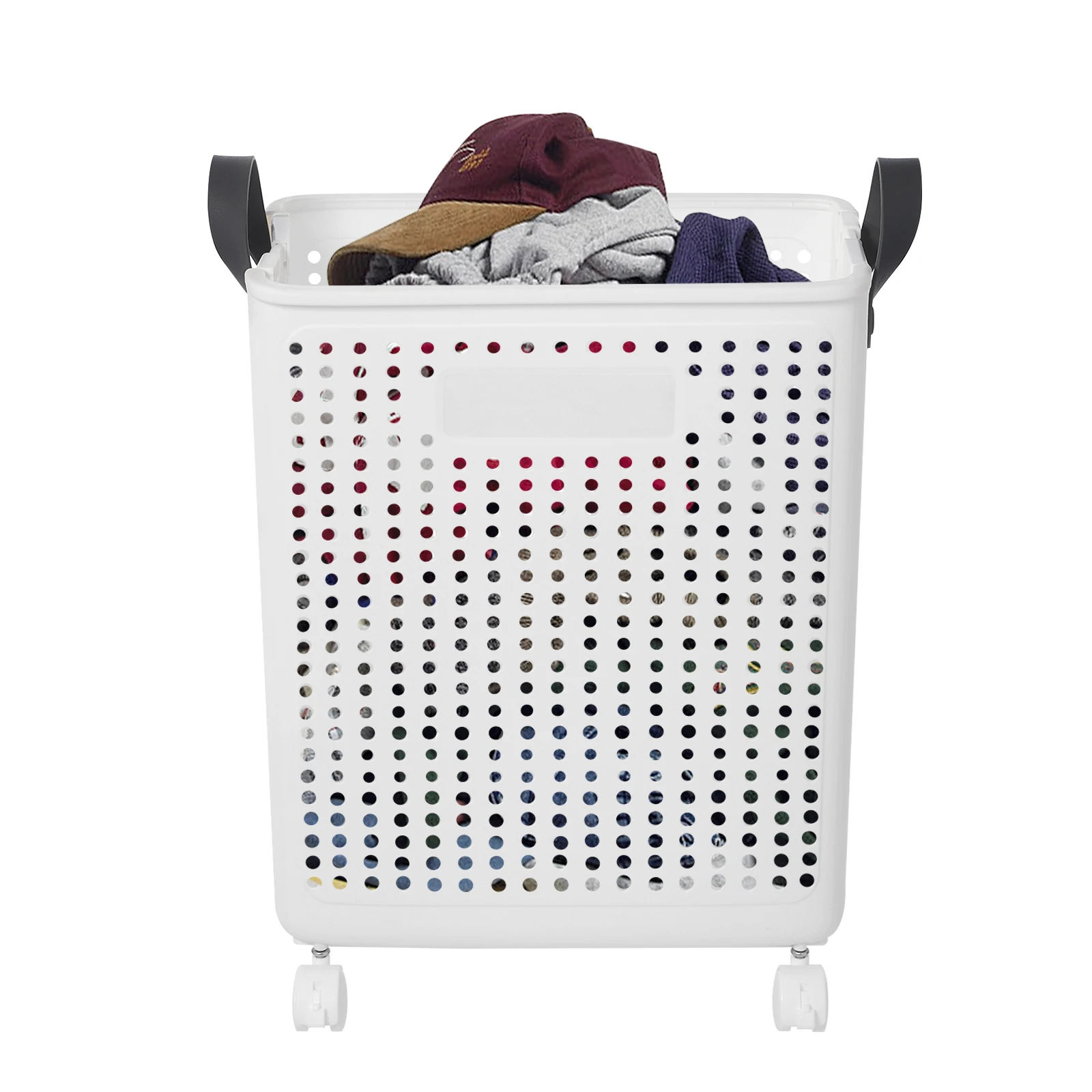
Creative DIY and Budget-Friendly Alternatives
Commercial solutions aren’t the only answer to small-space laundry challenges. With creativity and simple materials, custom solutions can be created at minimal cost.
Repurposing Household Items
Transform existing items into laundry storage:
* Canvas tote bags hung from sturdy hooks
* Decorative baskets repurposed from other rooms
* Vintage suitcases with added ventilation holes
* Fabric pillowcases with added handles for transport
These creative reuse ideas often cost nothing while providing personalized solutions tailored to your specific space constraints.
Simple Modifications
Enhance basic options with functional upgrades:
* Adding casters to standard baskets for mobility
* Attaching hooks or handles to improve functionality
* Installing dividers in larger containers for sorting
* Adding liners to decorative baskets for protection
Basic supplies like adhesive hooks, small casters, or fabric scraps can transform standard items into specialized laundry solutions for just a few dollars.
Fabric DIY Projects
Simple sewing projects for custom solutions:
* Over-door hanging hampers from durable canvas
* Drawstring laundry bags in space-specific dimensions
* Divided sorters from repurposed fabric
* Collapsible hampers with flexible supports
Basic sewing skills and approximately 1-2 yards of durable fabric can create custom solutions for $10-15, significantly less than commercial alternatives.
Upcycling for Sustainability
Environmentally friendly approaches:
* Converting damaged furniture into laundry stations
* Transforming wooden crates with added liners
* Repurposing metal baskets with custom covers
* Creating wall-mounted systems from reclaimed materials
These projects not only save money but reduce environmental impact through creative reuse of existing materials.
For even more innovative approaches, explore our collection of creative laundry basket ideas featuring solutions from real homes.
Can Small Laundry Baskets Still Hold Enough Clothes?
Many homeowners worry that space-saving designs sacrifice necessary capacity. Let’s address this common concern with practical information.
Capacity vs. Footprint
Small doesn’t necessarily mean insufficient. Modern designs optimize internal volume while minimizing external dimensions:
* A standard hamper occupies approximately 2.5-3 cubic feet of space
* Space-saving designs can provide 1.5-2 cubic feet of capacity in half the footprint
* Vertical designs often hold the same volume as wider options through increased height
Capacity Guidelines by Household Size
- Single person: 1.5-2 cubic feet (approximately 10-12 pounds of laundry)
- Couple: 2-2.5 cubic feet (approximately 15-18 pounds of laundry)
- Family of 3-4: Either one 3+ cubic foot hamper or multiple smaller units totaling 4-5 cubic feet
Maximizing Capacity Strategies
Several approaches increase capacity without increasing footprint:
* Compression bags that reduce volume of soft items
* Vertical designs that utilize height rather than width
* Collapsible sides that expand only when needed
* Strategic placement of multiple smaller units rather than one large one
Single Large vs. Multiple Small Units
Consider these factors when deciding between approaches:
* Multiple small units facilitate sorting but require multiple locations
* A single large unit conserves overall space but may make sorting more challenging
* Small units distribute weight for easier handling
* Multiple units can be placed in otherwise unusable nooks
For additional clever approaches to maximizing capacity in minimal space, our guide to space-saving basket hacks provides tested solutions from small-space experts.
Black Wicker Baskets, Rattan Storage Baskets, Tall Wicker Baskets, Wicker Shelf Baskets, Woven Storage Baskets
5-Tier Distressed Black Wood Frame Storage Tower with Removable Wicker Baskets for Home Organization$715.80 Select options This product has multiple variants. The options may be chosen on the product pageWicker Laundry Baskets, Woven Laundry Baskets, Woven Storage Baskets
$392.02 Select options This product has multiple variants. The options may be chosen on the product pageWicker Baskets with Handles, Wicker Storage Baskets, Woven Storage Baskets
$137.92 Select options This product has multiple variants. The options may be chosen on the product pageLarge Wicker Laundry Baskets, Tall Wicker Baskets, Woven Laundry Hampers, Woven Storage Baskets
$130.54 Select options This product has multiple variants. The options may be chosen on the product pageWoven Laundry Baskets, Woven Laundry Washing Baskets
Price range: $136.76 through $581.37 Select options This product has multiple variants. The options may be chosen on the product pageWicker Hampers with Lids, Wicker Laundry Baskets with Lids, Wicker Laundry Hampers
$127.33 Select options This product has multiple variants. The options may be chosen on the product page
How to Keep Laundry Fresh in Small Spaces?
Limited space can create challenges for maintaining freshness, particularly when laundry must be stored longer between wash days or in potentially humid environments.
Ventilation Considerations
Proper airflow prevents mustiness and odors:
* Choose baskets with open weave designs
* Position hampers away from steam sources when possible
* Select containers with ventilation holes if solid-sided
* Avoid airtight containers for dirty laundry storage
Natural materials like those used in Tidy Treasure’s basket collections provide inherent breathability that helps maintain freshness between laundry days.
Materials for Mildew Resistance
Some materials naturally resist moisture problems:
* Natural rattan and wicker allow air circulation
* Quick-drying synthetic fabrics resist mildew development
* Antimicrobial-treated containers actively prevent odor-causing bacteria
* Moisture-wicking liners draw dampness away from clothing
Liner Options for Easy Cleaning
Removable liners extend basket life while improving hygiene:
* Machine-washable fabric liners for natural baskets
* Waterproof liners for containing damp items
* Replaceable mesh bags that allow continued ventilation
* Antimicrobial treatments for added protection
Natural Odor Absorption
Simple additions neutralize odors without chemicals:
* Small fabric sachets of activated charcoal
* Lavender or cedar inserts for natural freshness
* Baking soda sachets for odor neutralization
* Essential oil applications on wooden or natural fiber baskets
A weekly cleaning routine for your laundry storage container itself—wiping with vinegar solution for natural materials or disinfectant for synthetic ones—maintains freshness even in confined spaces.
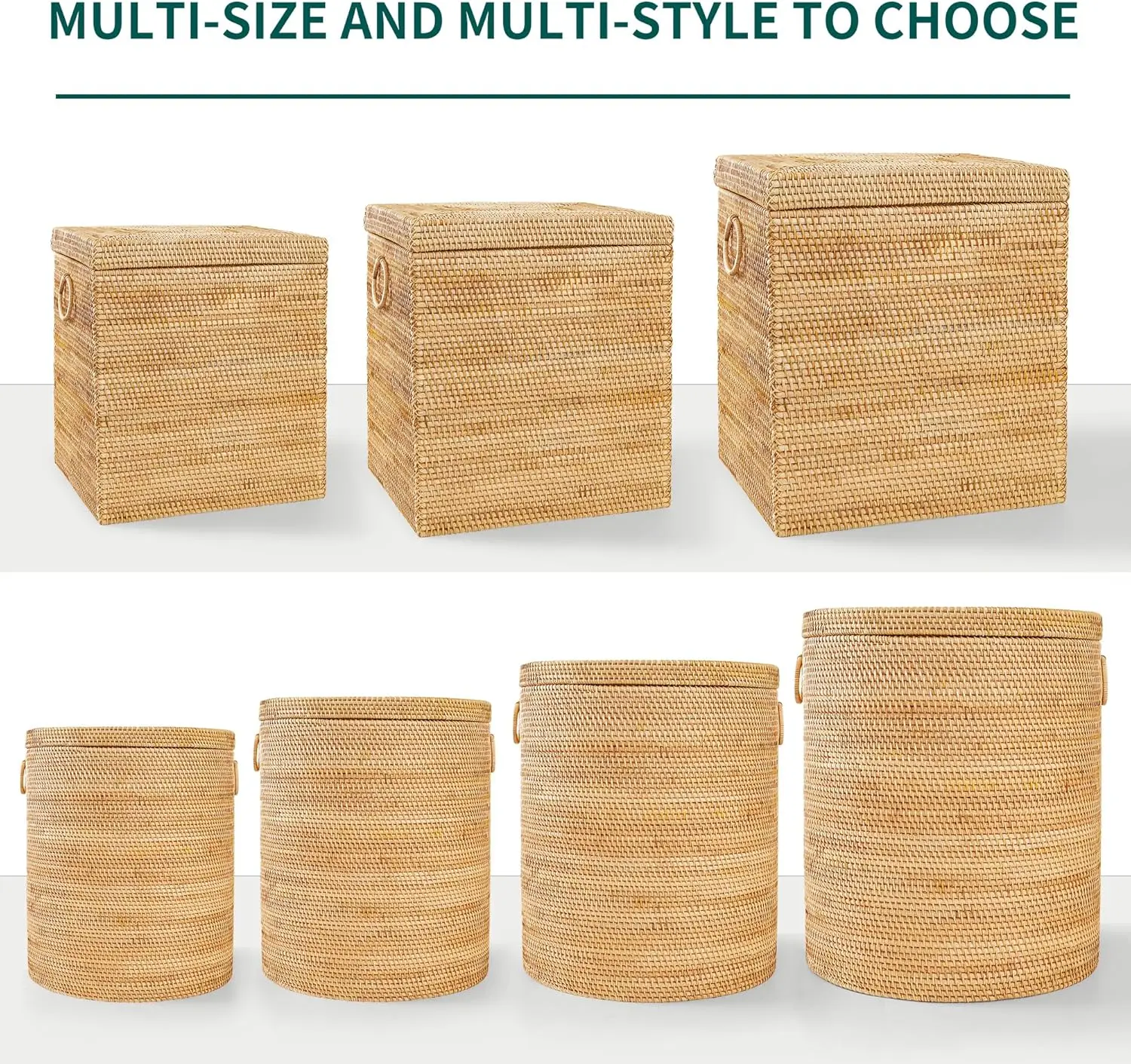
Integrating Your Laundry System with Small Home Organization
The most effective small-space solutions don’t exist in isolation—they form part of a cohesive organization strategy throughout the home.
Coordinated Organization
Visual harmony reduces the perception of clutter:
* Choose laundry baskets that complement other storage containers
* Select consistent materials or colors throughout small spaces
* Integrate laundry solutions with bathroom or bedroom storage systems
* Consider sight lines and visual impact from different areas
When laundry storage coordinates with other elements, it becomes part of the design rather than an intrusion.
Creating Functional Zones
Even in multi-use spaces, defined areas improve efficiency:
* Designate specific corners or nooks for laundry functions
* Use vertical space above washing machines for sorting systems
* Create mini-laundry stations in bedrooms or bathrooms
* Utilize transitional spaces like hallways for narrow sorting systems
These zone-based approaches keep laundry contained while maximizing functionality of limited square footage.
Storage for Laundry Supplies
Complete systems include supply storage:
* Wall-mounted shelves above hampers for detergents
* Narrow rolling carts between appliances for supplies
* Over-door organizers for small laundry items
* Magnetic strips for holding small metal tools
Integrating supply storage with laundry collection points creates complete solutions that streamline the entire process.
Maintaining Flow in Tight Quarters
Thoughtful placement preserves movement and function:
* Position hampers where they won’t impede traffic patterns
* Choose lids that don’t require extensive clearance to open
* Select shapes that follow room contours rather than creating obstacles
* Consider access needs when positioning in relation to doors or fixtures
For comprehensive approaches to integrating laundry into overall organization, our guide to best space-saving hampers and baskets provides whole-home strategies.
Where to Find Specialty Laundry Baskets for Small Spaces
Now that you understand what to look for, where can you find these specialized solutions?
Retailers Specializing in Small Spaces
Certain stores focus specifically on compact living solutions:
* Container stores and organization specialty shops
* Japanese and Scandinavian design retailers known for small-space expertise
* Dorm supply retailers with space-efficiency focus
* Online marketplaces with small apartment categories
These specialized retailers often provide detailed dimensions and space-saving features in product descriptions.
Online Marketplaces
Digital shopping provides the widest selection:
* Dedicated home organization websites
* Major online retailers with advanced filtering options
* Direct-from-manufacturer websites for specialty items
* Handmade marketplaces for custom or unique solutions
When shopping online, pay special attention to exact dimensions and read reviews from other small-space dwellers.
Product Description Indicators
Look for these terms indicating small-space suitability:
* “Slim profile” or “narrow design”
* “Space-saving” or “compact footprint”
* Specific dimensions under 18 inches in width
* “Collapsible,” “foldable,” or “stackable” features
* “Apartment-sized” or “dorm-compatible”
The perfect solution for your space might come from our specialized collections of woven laundry baskets or comprehensive laundry solutions designed with small spaces in mind.
With careful assessment, thoughtful selection, and creative integration, your small space can accommodate efficient laundry management without compromising style or functionality. The key is choosing solutions that work specifically with your unique space constraints and lifestyle needs rather than against them.

